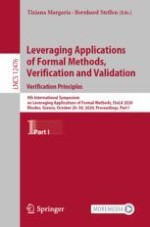2020 | OriginalPaper | Buchkapitel
Abstraction and Genericity in Why3
verfasst von : Jean-Christophe Filliâtre, Andrei Paskevich
Erschienen in: Leveraging Applications of Formal Methods, Verification and Validation: Verification Principles
Aktivieren Sie unsere intelligente Suche, um passende Fachinhalte oder Patente zu finden.
Wählen Sie Textabschnitte aus um mit Künstlicher Intelligenz passenden Patente zu finden. powered by
Markieren Sie Textabschnitte, um KI-gestützt weitere passende Inhalte zu finden. powered by

 field, which limits the usefulness of this kind of construction. This may be relaxed in the future.
field, which limits the usefulness of this kind of construction. This may be relaxed in the future.